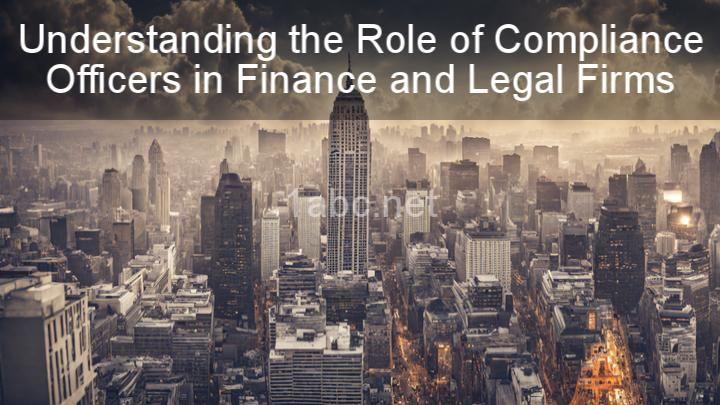Understanding the Role of Compliance Officers in Finance and Legal Firms

Introduction:
Compliance officers play a crucial role in finance and legal firms, ensuring adherence to laws, regulations, and ethical standards. In recent years, the importance of compliance officers has grown exponentially as financial crimes and regulatory violations have become more prevalent. According to a survey conducted by PwC, 79% of financial firms have increased their compliance budgets, highlighting the industry's recognition of the need for robust compliance practices. In this blog post, we will delve into the responsibilities, challenges, and career opportunities of compliance officers in finance and legal firms.
I. What is a Compliance Officer?
A compliance officer is an individual responsible for overseeing and enforcing compliance with laws, regulations, and industry standards within an organization. In finance and legal firms, their role is critical in maintaining the integrity of the industry. Compliance officers ensure that the organization operates within the boundaries set by regulatory bodies and maintains high ethical standards. Their duties include conducting risk assessments, developing compliance policies and procedures, monitoring internal controls, and educating employees on regulatory requirements.
II. Key Skills and Qualifications
To excel as a compliance officer, one must possess a combination of technical and soft skills. Technical skills include a deep understanding of relevant laws and regulations, risk management techniques, and industry-specific knowledge. Compliance officers must stay abreast of ever-changing regulations to effectively implement compliance programs. Soft skills, such as communication, analytical thinking, and attention to detail, are equally important. Compliance officers often interact with stakeholders at various levels within the organization, making effective communication crucial.
For example, a compliance officer may be tasked with implementing a new regulation on anti-money laundering (AML). They must possess the technical knowledge of AML laws, but also the soft skills to effectively communicate the new requirements to employees, ensuring that they understand their obligations and can implement necessary controls.
III. The Importance of Compliance Officers
Compliance officers play a vital role in maintaining trust within the finance and legal industry. By ensuring organizations adhere to regulations and ethical standards, they protect clients' interests and prevent financial crimes such as fraud, money laundering, and insider trading. Compliance officers contribute to the industry's overall stability and credibility, promoting transparency, accountability, and ethical behavior.
In finance firms, compliance officers are responsible for monitoring investment activities, ensuring compliance with securities regulations, and protecting clients' investments. In legal firms, compliance officers ensure adherence to legal and ethical rules, preventing conflicts of interest and maintaining the confidentiality of client information. Their role is indispensable in maintaining the integrity of the industry.
IV. Challenges Faced by Compliance Officers
Compliance officers face a multitude of challenges in their daily work. One of the significant challenges is keeping up with evolving regulations. Laws and regulations are constantly changing, requiring compliance officers to stay updated and adapt their compliance programs accordingly. Additionally, the rapid advancement of technology presents challenges, as organizations must ensure compliance in areas such as data privacy and cybersecurity.
Another common challenge is managing conflicting priorities. Compliance officers must balance the need for regulatory compliance with business objectives, often facing pressure to meet financial targets. They must navigate this delicate balance while upholding ethical standards and protecting the organization's reputation.
To overcome these challenges, compliance officers can implement strategies such as leveraging technology for efficient compliance monitoring, establishing strong relationships with regulatory bodies, and fostering a culture of compliance within the organization.
V. Career Opportunities in Compliance
A career in compliance offers numerous opportunities for those interested in the field. Individuals can pursue a career as a compliance officer within finance and legal firms, working directly with industry professionals to ensure regulatory compliance. Compliance officers can also specialize in specific areas such as anti-money laundering, data privacy, or risk management.
Moreover, compliance officers can explore career growth opportunities within finance and legal firms. With experience and expertise, they may progress to roles such as compliance manager, chief compliance officer, or even executive-level positions. Professional certifications and educational programs, such as Certified Regulatory Compliance Manager (CRCM) or Certified Anti-Money Laundering Specialist (CAMS), can enhance one's prospects in the field.
VI. Best Practices for Effective Compliance Management
Establishing robust compliance management systems is crucial for finance and legal firms. Some best practices include regular training programs to educate employees on regulatory requirements and ethical standards. Risk assessments should be conducted to identify and mitigate potential compliance risks. Internal controls and monitoring processes should be implemented to ensure ongoing compliance and the detection of any violations.
Collaboration between departments is essential to foster a culture of compliance. Compliance officers should work closely with legal, risk management, and operations teams to align compliance practices with the organization's overall objectives. By integrating compliance into the fabric of the organization, finance and legal firms can effectively navigate the complex regulatory landscape.
Conclusion:
Compliance officers play a vital role in maintaining the integrity of finance and legal firms. Their responsibilities encompass ensuring adherence to laws, regulations, and ethical standards, thereby protecting clients' interests and preventing financial crimes. The role of compliance officers is indispensable in promoting transparency, accountability, and ethical behavior within the industry.
As the regulatory environment continues to evolve, compliance officers face challenges such as changing regulations, evolving technology, and managing conflicting priorities. However, by leveraging their skills, knowledge, and adopting best practices, compliance officers can effectively navigate these challenges.
For individuals interested in pursuing a career in compliance, various opportunities exist within finance and legal firms. With the right skills, qualifications, and professional certifications, one can carve a successful career path in this field.
In conclusion, compliance officers play a vital role in maintaining the integrity and trustworthiness of finance and legal firms. Their commitment to regulatory compliance and ethical standards ensures the stability and credibility of the industry as a whole. It is imperative for organizations to recognize the importance of compliance officers and invest in robust compliance management systems to foster a culture of compliance and uphold the highest standards of integrity.
FREQUENTLY ASKED QUESTIONS
What is the role of a compliance officer in finance and legal firms?
Compliance officers play a crucial role in both finance and legal firms. Their primary responsibility is to ensure that the organization and its employees adhere to relevant laws, regulations, and internal policies. Here are some key functions of a compliance officer in finance and legal firms:
- Developing and implementing compliance programs: Compliance officers create and manage comprehensive compliance programs that outline the company's policies and procedures and help prevent illegal or unethical behavior.
- Monitoring regulatory changes: They stay updated on changes in laws and regulations related to finance and legal practices and ensure that the organization remains in compliance with these requirements.
- Conducting risk assessments: Compliance officers identify potential areas of risk and assess the organization's exposure to regulatory, legal, and reputational risks. They then implement necessary controls to mitigate these risks.
- Training and education: They provide training to employees on compliance-related matters, including ethical conduct, anti-money laundering, data protection, and insider trading policies.
- Internal audits: Compliance officers perform regular internal audits to assess the effectiveness of compliance programs and identify any areas for improvement.
- Reporting and investigation: They manage the process of reporting compliance violations, conducting investigations, and recommending disciplinary actions when necessary.
- Collaboration with regulatory bodies: Compliance officers act as a liaison between the organization and regulatory authorities, ensuring that all reporting requirements are met and providing assistance during regulatory audits.
By fulfilling these roles, compliance officers help maintain the integrity of financial and legal operations, protect the firm's reputation, and minimize legal and financial risks.
What are the key responsibilities of a compliance officer?
The key responsibilities of a compliance officer typically include:
- Developing and implementing compliance policies and procedures within an organization.
- Monitoring and ensuring compliance with applicable laws, regulations, and industry standards.
- Conducting regular audits and risk assessments to identify potential compliance issues.
- Providing employees with training and guidance on compliance matters.
- Investigating and reporting any violations of compliance policies or regulations.
- Collaborating with internal teams to develop and maintain an effective compliance program.
- Keeping up-to-date with changes in laws and regulations that may impact the organization.
- Responding to inquiries, issues, and concerns related to compliance from employees or external parties.
- Recommending improvements to existing policies and controls to enhance compliance efforts.
- Cooperating with regulatory authorities during audits or investigations.
Please note that the specific responsibilities may vary depending on the industry, organization size, and specific compliance requirements.
How does a compliance officer ensure adherence to regulations and laws?
A compliance officer ensures adherence to regulations and laws through various methods:
- Monitoring and Assessment: Compliance officers regularly monitor and assess the organization's operations to identify any potential areas of non-compliance.
- Policy and Procedure Development: They develop comprehensive policies and procedures that provide clear guidelines for employees to follow, ensuring compliance with laws and regulations.
- Training and Education: Compliance officers provide training and education programs to employees, informing them about relevant regulations and laws, and how to comply with them.
- Auditing and Internal Controls: They establish auditing processes and internal controls to verify compliance with regulations. This includes conducting regular audits, reviewing documentation, and evaluating the effectiveness of control measures.
- Reporting and Documentation: Compliance officers maintain accurate records and documentation to demonstrate adherence to regulations and laws. They also prepare reports on compliance activities for management and relevant regulatory bodies.
- Collaboration and Communication: They collaborate closely with various stakeholders, such as legal teams, management, and regulatory authorities, to stay updated on regulatory changes, exchange information, and ensure compliance efforts are aligned.
- Investigation and Remediation: When non-compliance issues arise, compliance officers investigate and address them promptly. This may involve implementing corrective actions, mitigating risks, and rectifying any violations.
By employing these strategies, compliance officers play a crucial role in ensuring organizations operate within the boundaries of laws and regulations.
What qualifications and skills are required to become a compliance officer?
To become a compliance officer, there are certain qualifications and skills that are typically required. These may vary based on the specific industry or organization, but here are some common requirements:
- Education: A bachelor's degree in a relevant field such as business, finance, law, or a related discipline is often required. Some organizations may prefer candidates with a master's degree or professional certifications in compliance management.
- Knowledge of Laws and Regulations: Compliance officers need to have a strong understanding of relevant laws, regulations, and industry standards that govern their organization. This includes areas such as data protection, anti-money laundering, consumer protection, and more.
- Analytical and Problem-Solving Skills: Compliance officers should have strong analytical and problem-solving skills to identify potential compliance risks and develop strategies to mitigate them. They need to be able to analyze complex information and make informed decisions.
- Attention to Detail: The role of a compliance officer requires meticulous attention to detail. They must carefully review policies, procedures, and documentation to ensure compliance with laws and regulations and identify any potential issues or gaps.
- Communication and Interpersonal Skills: Excellent communication skills are essential for compliance officers. They need to be able to effectively communicate compliance requirements to employees and management, conduct training programs, and interact with external stakeholders, regulators, and auditors.
- Ethical Conduct: Compliance officers must have a strong sense of ethics and integrity. They are responsible for ensuring that the organization adheres to legal and ethical standards, so they need to be able to act impartially and independently.
- Continuous Learning: The field of compliance is constantly evolving, so a willingness to continuously learn and stay updated on new regulations and industry best practices is crucial for a compliance officer.
It's important to note that these qualifications and skills can vary depending on the specific job requirements and the industry in which the compliance officer works.
